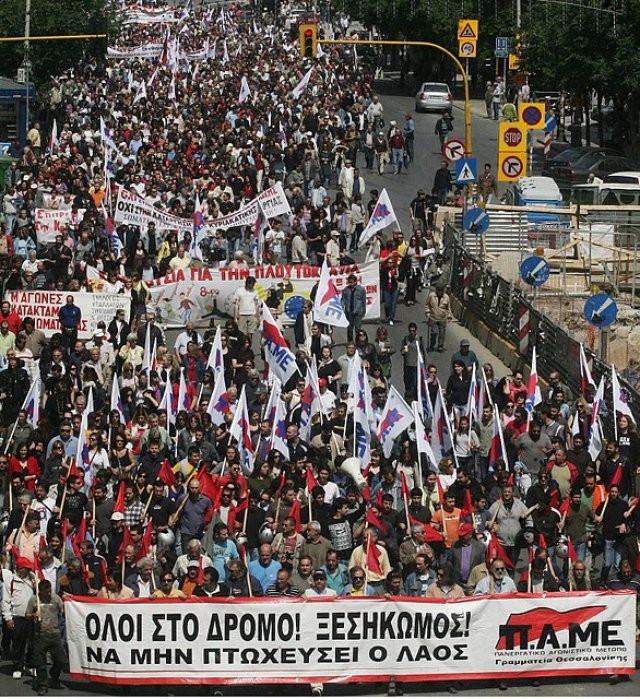
Resistance is building in Europe against government attempts to force ordinary people to bailout the failed financial system of “casino” capitalism.
After four general strikes in Greece this year, and two more planned, strike action is beginning in Spain against planned attacks on public services and welfare.
On May 27, the Spanish government, by just a single vote, passed a law cutting all public sector wages by 5% cutting public sector wages by 5%, the Madrid El Pais said on May 28. The law also cut pensions and increased the official retirement age and slashed funding for public education, health, third-world development aid, research, local government, new families, the disabled and the mentally ill.
The public will feel the pain of €11 billion (almost $16 billion) of spending cuts per year, largely to pay for the Spanish government’s €9 billion bank bailout last year.
The May 27 Madrid El Diagonal said public sector workers in the Basque region went on strike on May 25. Their colleagues in Madrid will strike on June 8.
The largest unions, the General Union of Workers (UGT) and the Workers’ Commissions (CCOO), have said they are prepared to call a general strike if the government refuses to respond to calls for compromise.
Together, they have more than 2.2 million members. These two unions have historically been closest to the government. Salce Elvira, CCOO spokesperson, said on May 27: “[Prime Minister Luis] Zapatero broke with the consensus and all precedent.’
Zapatero is the leader of the Socialist Workers Party of Spain — an even more misleading name than the Australian Labor Party.
His government is under huge pressure to reduce its budget deficit, both from inside and outside Spain. Each time an international credit ratings’ agency lowers Spain’s credit rating, the decision is front-page news in the corporate press.
When Spain’s credit rating is lowered, the government is forced to pay higher interest payments on its debts. Financial speculators become more and more paranoid that the nations they call “the PIIGS” (Portugal, Ireland, Italy, Greece and Spain) will default, which only makes it more difficult for these countries to attract new finance.
This dynamic is exacerbated by foreign investment banks, which now invest at least as much in collapse as in growth. Financial deregulation in the US in recent years means that bets on debt obligations can be drawn up without either side in the deal actually holding the debt.
Investment banks are earning billions running what is essentially an international TAB, in which they are advisors to most of the racehorse trainers and football coaches and at the same time act as “managers” of the punters’ funds.
Investment banks’ “managed funds” divisions regularly “lose” money from workers’ superannuation funds in bets with their own trades division in an array of complicated derivatives.
The banks, therefore, often have an enormous interest in creating economic turmoil. For example, the speculation over the “PIIGS crisis” is also causing the value of the euro to fall, which has in turn prompted other EU nations, notably Germany and France, to intervene in these countries’ policy-making.
Upon accepting loans totalling more than €100 billion this May, Greece’s budget is now determined by the European Union and the International Monetary Fund, a May 25 Counterpunch.org article said.
Instead of raising the corporate or capital gains tax rate, or cracking down on tax evasion, they’ve taken Greece down the same road that Spain is being forced to follow.
Counterpunch.org said guaranteed earners like airports, highways and even the lottery have been privatised and sold off to foreign investors at garage-sale prices.
Unemployment in Greece, already at 12%, is expected to hit 20% in 2011. There is widespread rejection of the entire political economic system. A recent poll found that one-third of voters would boycott any election held.
Although the EU and the corporate press talk of “rescue packages” for Greece and other debt-burdened governments, their “aid” is offered at standard interest rates, 5–6% in the case of Greece.
Pawning off public assets and cutting public services and salaries will not create the sustainable growth needed to pay off debts in the long-term.
Spain’s credit rating was actually further lowered the day after the government passed the recent budget cuts because, according to the agency Fitch, the program “will materially reduce the rate of growth of the Spanish economy over the medium-term”.
The policies of the EU and IMF demonstrate that their intention is to save private banks from collapsing along with the bubble they created. Again, it is taxpayers in the EU who will have to pay for this “rescue”.
European banks are owed about €2.3 trillion by debtors in Portugal, Italy, Ireland, Greece and Spain. Their goal is to grab as much from these countries in the short-term as possible, even if it means leaving them to long-term ruin.
The expansion of the financial crisis into southern Europe is further proof of the financial aristocrats’ drive to socialise losses and privatise profits. They enrich themselves at every opportunity and force the public to pay more and more every time to save their system from collapse.
Resistance to this extortion is certain to intensify over the next 18 months.